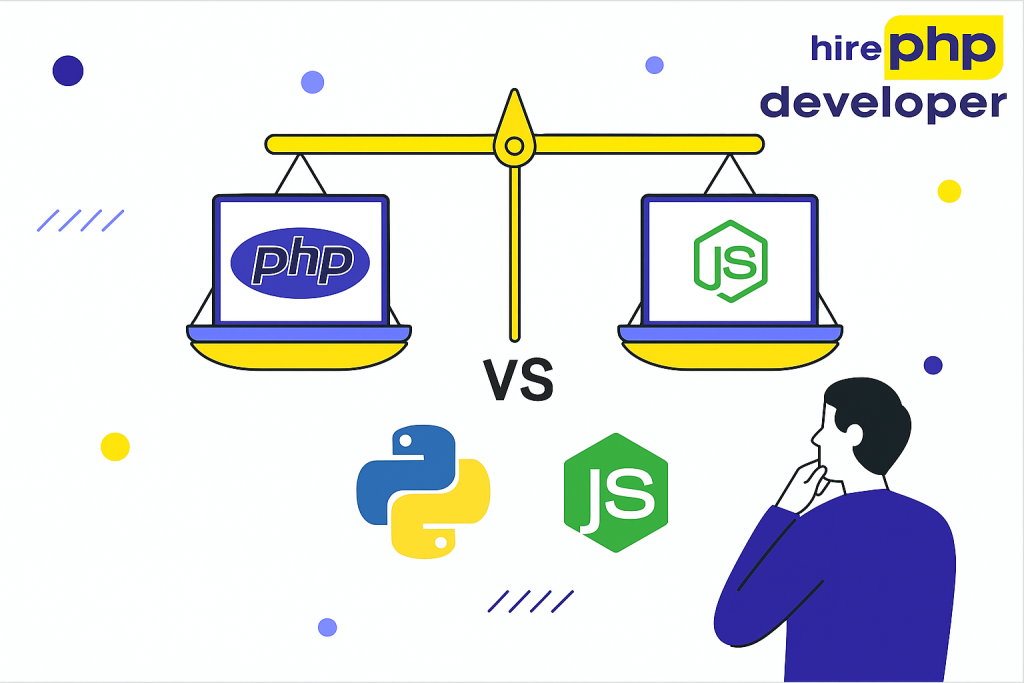- July 22, 2025
- Posted by: Hermit Chawla
- Category: Uncategorized

Introduction
In today’s web development landscape, choosing the right backend technology is crucial for project success. Three dominant options—PHP, Python, and Node.js—each offer unique strengths and capabilities. As web applications grow more complex, understanding these technologies has become essential for developers and businesses alike.
This guide examines PHP, Python, and Node.js in detail, covering their strengths, weaknesses, and ideal use cases to help you make an informed decision that aligns with your project requirements.
Understanding the Contenders
PHP: The Web Development Pioneer
PHP has been a foundation of web development since 1994. Powering approximately 78% of websites with known server-side programming, including WordPress, Facebook, and Wikipedia, PHP’s enduring popularity comes from its simplicity and extensive ecosystem.
The language integrates directly into HTML, making it accessible for beginners while offering powerful capabilities for experienced developers. Modern PHP versions provide robust object-oriented features, improved performance, and enhanced security. Its ecosystem includes powerful frameworks like Laravel, CodeIgniter, Symfony, and CakePHP, which promote clean architecture and maintainable systems.
Python: The Versatile Powerhouse
Python has emerged as one of technology’s most versatile programming languages. Created in 1991, Python is known for its clean, readable syntax and powerful capabilities. While not originally designed specifically for web development, it has become popular for backends due to its simplicity and extensive library support.
Python’s philosophy emphasizes readability and developer productivity. Its syntax is often described as “executable pseudocode,” making it accessible while providing power for complex applications. Python excels beyond web development in data science, artificial intelligence, and automation.
For web development, Python offers frameworks like Django and Flask. Django provides a comprehensive approach with built-in admin panels and security features, while Flask offers a lightweight, flexible foundation.
Node.js: The JavaScript Everywhere Solution
Node.js, introduced in 2009, represents a paradigm shift in web development. Unlike PHP and Python, Node.js is a runtime environment that executes JavaScript outside a web browser, allowing developers to use the same language for both client-side and server-side development.
Built on Chrome’s V8 JavaScript engine, Node.js employs an event-driven, non-blocking I/O model that makes it efficient and ideal for real-time applications. The Node.js ecosystem includes npm (Node Package Manager) with over a million packages, and popular frameworks like Express.js, Nest.js, and Koa.js.
If you’re looking for Node.js developers to build real-time applications or scalable APIs, hiring a skilled team can maximize performance and flexibility for your web application.
Performance Comparison
Processing Speed and Efficiency
Node.js often leads in raw processing speed thanks to its non-blocking architecture, allowing it to handle multiple concurrent connections efficiently.
Python typically performs slower than both PHP and Node.js in web contexts due to its interpreted nature and the Global Interpreter Lock (GIL), though it’s sufficient for most applications.
PHP has made significant performance improvements in versions 7 and 8, handling high traffic loads efficiently, though generally falling behind Node.js in concurrent connections.
Memory Usage
Memory consumption varies across technologies:
- PHP has moderate memory usage, with each request spawning a new process or thread
- Python’s memory footprint is generally higher, varying by framework and application architecture
- Node.js often has the lowest initial memory footprint, but can grow under load
Concurrency Model
Each technology handles concurrent requests differently:
- PHP uses a process-per-request or thread-per-request model, simple but potentially limiting scalability
- Python offers various concurrency options, including threads, processes, and asynchronous programming
- Node.js excels in concurrency with its event loop and non-blocking I/O, handling thousands of concurrent connections efficiently</h2>
Development Experience
Learning Curve and Accessibility
PHP offers a gentle learning curve for beginners, with straightforward syntax and the ability to embed code directly into HTML.
Python is often praised as one of the most beginner-friendly languages, with clean, readable syntax that reduces cognitive load on developers.
Node.js has a moderate learning curve. While JavaScript is accessible, mastering asynchronous programming concepts like promises and async/await can challenge beginners.
Ecosystem and Libraries
PHP boasts a mature ecosystem with established frameworks and solutions for virtually every web development challenge.
Python’s ecosystem extends beyond web development, with libraries for data analysis, machine learning, and scientific computing. For web development, Django and Flask provide robust frameworks.
Node.js features npm, the world’s largest package ecosystem, allowing developers to find ready-made solutions for most requirements.
Use Cases and Strengths
When to Choose PHP
PHP excels in:
- Content-driven websites and blogs
- E-commerce platforms
- Traditional web applications with server-rendered pages
- Projects requiring quick development
- Applications integrating with CMS platforms like WordPress
PHP’s integration with web servers like Apache and Nginx is seamless, and the LAMP stack remains reliable for many projects.
When to Choose Python
Python stands out for:
- Data-intensive applications requiring analysis
- AI and machine learning integration
- Scientific computing applications
- Complex business logic implementation
- Educational programming and prototyping
Python’s strength lies in its versatility and readability, particularly when integrating data science or machine learning components.
When to Choose Node.js
Node.js shines in:
- Real-time applications (chat, collaboration tools)
- Single-page applications with client-side rendering
- REST APIs and microservices
- Streaming applications
- Applications requiring high concurrency
Node.js’s non-blocking model makes it ideal for maintaining many open connections simultaneously.
Scalability Considerations
PHP applications traditionally scale horizontally by adding server instances. Modern PHP frameworks have improved vertical scaling capabilities.
Python applications can face scaling challenges due to the GIL, but support multiple deployment strategies to mitigate limitations.
Node.js offers excellent vertical scaling due to its non-blocking architecture and can use clustering for horizontal scaling across multiple CPU cores.
All three technologies enjoy robust support across major cloud platforms, with good integration for containerization and serverless architectures.
Community and Long-term Support
PHP maintains a large, active community with regular releases and improvements. The PHP Foundation helps ensure the language’s future development.
Python boasts one of the largest programming communities globally, with steady growth driven by emerging fields like data science.
Node.js has a vibrant, rapidly evolving community centered around npm and GitHub, governed by the OpenJS Foundation.
Making Your Decision
Choosing between these technologies should depend on:
- Project requirements and type
- Team expertise
- Development timeline and budget
- Performance and scalability needs
- Integration requirements
Each technology has its strengths, and often the best choice aligns with your specific requirements while leveraging existing team skills.
Conclusion
In web development, PHP, Python, and Node.js each offer unique advantages. PHP excels in content-driven websites with its mature ecosystem. Python provides versatility, particularly for applications integrating data science. Node.js stands out for real-time applications where performance and scalability are crucial.
As you plan your next project, consider both your requirements and your team’s expertise. Our company specializes in providing expert development services across these technologies, with particular expertise in PHP development. We offer specialized PHP services including Laravel, CodeIgniter, CakePHP, and Zend framework development. We also provide Node.js development services for projects requiring real-time capabilities and high concurrency.
Contact us today to discuss how our PHP and Node.js development services can bring your web application vision to life.



